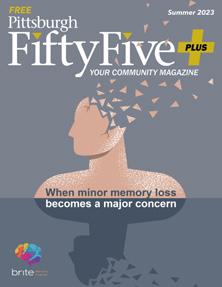
3 minute read
Campus Counseling Services: How to Utilize Them and When to Seek Help
By Maura L. Johnson, LCSW, PMH-C
As the final weeks of summer commenced, many families experienced a very different back-to-school season than years past. Whether this was your first child going to college or your fourth, each time leads to a shift in the family dynamics within the home. It’s common to experience a range of emotions, such as overwhelming pride, happiness and excitement alongside sadness and grief. Children provide such a tangible reminder of how quickly time passes and the transitional time after graduation only serves to highlight this further. While so many exciting experiences await them, it’s not uncommon for some students to need extra support while away from home. Campus counseling services can provide a safe, confidential space for students to seek the help they need.
Counseling services at colleges and universities may vary, but they are often an included benefit within the tuition and fee schedule. They are typically staffed with licensed counseling professionals and graduate student interns undergoing supervision. Depending on the size and resources of the college/university, they may offer long-term counseling, group counseling and/or support groups. Many universities will offer shorter term counseling, with a plan to refer to a local therapist for transition of care. Crisis services are also a resource available to most students and are typically staffed 24/7. While 911 is often our first thought in a crisis, mental health crisis lines/support provide an opportunity to talk through what is occurring and develop a safety plan.
So how do you recognize when it’s time to utilize these services? There can be a variety of reasons why one may want or need to engage these supports. The transition from living at home with family/caregivers, seeing long-term friends and leaving athletic teams can be fairly jarring for many students. Adjusting to more autonomy can be amazing but also leave some feeling slightly adrift. Academic expectations may seem more manageable than some high school classes while others far more intense. While all of this adjustment can be exciting, it is very common to struggle with feelings of overwhelm. Campus counselors are trained to support students during this time and work through the growing pains of transition. It’s important for students to know they are not alone in their feelings and things will improve as the semesters progress.
Campus counseling services are also indicated for more serious struggles, such as anxiety and depression. While an adjustment period is expected and feelings may vary, anyone experiencing low mood, low motivation, feelings of hopelessness/helplessness, impaired sleep and appetite and/or withdrawing from friends/loved ones and activities they typically enjoy for a period longer than two weeks should be evaluated for depression. If anxiety is occurring that impairs ability to focus, sleep, eat or otherwise imparting function (including panic attacks), this also indicates a need for more support. If suicidal thinking/ideation is occurring, reaching out to crisis services, in addition to counseling, is often necessary.
I often get asked in my practice whether a student can participate in campus counseling services while also retaining their current therapist. This is generally not an issue, as some students will prefer to have access to in-person appointments. If the student’s current therapist is also licensed in the state, the student is attending college, virtual appointments may occur (this may vary among state licensing boards). Students may also choose to utilize campus counseling while actively living on campus and see their “home therapist” during holi- days and summer breaks. If possible, collaboration between the treating therapists offers continuity of care and enables both professionals to support the student/client.
Most schools provide information for their mental health services on their website, as well as their crisis intervention services. It can be helpful to locate this information early in the semester and have it on hand, as needed. While some students may struggle with the idea of seeking help, it’s important for them to know that help is available. Counselors are there to provide support, validation and to ensure students have their best chance of success. n
Maura Johnson is a licensed clinical social worker currently in practice at Cranberry Psychological Center. She is a certified perinatal mental health provider, as well as a contributing staff member with Postpartum Support International. While her primary focus is treating PMADs, she also treats a variety of conditions and clients of all ages. She resides in the Pittsburgh area with her husband, Brendan, daughter, Sloane, and dog, Max.
Annual
Tickets On Sale Now
Wednesday, October 25, 2023 at The Westin Hotel
5:30 P.M.
Registration and Reception
Silent Auction
7:00 P.M.
Program and Dinner
Greet honorees during a cocktail reception, place bids on items in a robust silent auction featuring nearly 200 items, purchase tickets for a month-long raffle of 30 lavishly themed gift baskets, and enjoy a superb dinner.
To sponsor, reserve a table or tickets, contact paneid@upmc.edu or call 412-864-3524.
UPMC SENIOR SERVICES
UPMC WESTERN BEHAVIORAL HEALTH
2023 Champions
GRAND CHAMPION
Antoine Douaihy, MD
Senior Academic Director, Addiction Medicine Services
UPMC Western Psychiatric Hospital
COMMUNITY CHAMPION
Achieva Stephen H. Suroviec President and CEO
CAREGIVER CHAMPION
Jacqueline Dunbar-Jacob, PhD, RN, FAAN
Dean Emeritus, University of Pittsburgh
School of Nursing













